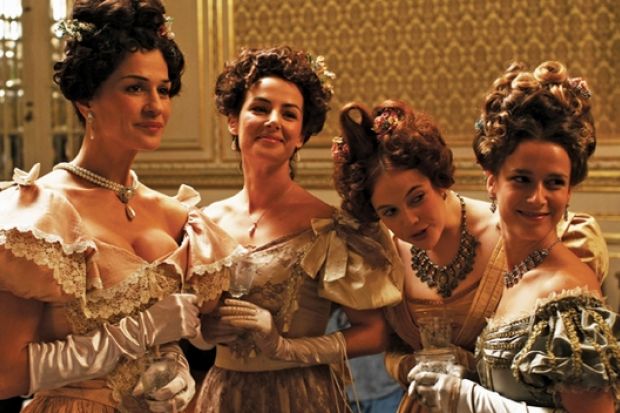Mysteries of Lisbon
Directed by Raúl Ruiz
Starring Adriano Luz, Maria Joao Bastos and Ricardo Pereira
Released in the UK on 9 December
No one could accuse Mysteries of Lisbon of lacking pace. I'm sorry to say I haven't read Camilo Castelo Branco's classic novel, but I suspect it's the sort of thing that comes in multiple volumes each of which could without difficulty prop open a large baronial door. At any rate, Raul Ruiz crams an epic quantity of narrative into four and a half hours of screen time, every minute of which will keep you on your toes.
Mysteries of Lisbon is a labyrinth of complex, interlocking yarns set in the 18th and 19th centuries, involving orphans whose mothers turn out to be countesses; priests disguised as gypsies; reformed assassins; manipulative fathers gone mad; long-lost fathers turned monks; servants with absurdly mincing walks; and gun-toting seductresses. This is a world in which entering a convent or joining a monastery really could be a good idea. A costume melodrama, the film embroils us in lurid episodes of sadism, torture, deathbed repentance, ballroom bitchery and necrophilia.
The plotting is more preposterous than Dickens at his most hare-brained, which in film is a huge asset. What is one to make, for instance, of a priest who keeps his mother's skull in an exquisitely carved wooden reliquary, an exhibit in his so-called "temple of sincerity"? Or a henchman called Knife-Eater who later turns up as a smartly kitted-out dandy with a blue parakeet? It's Jane Austen gone feral, as if Pride and Prejudice were rewritten by Hunter S. Thompson. The manner is Gothic: the appearance of a Catholic priest as its central character, and the recurrence of cells, darkened rooms and sinister servants, is enough to indicate that - as well as the allusion, halfway through, to the novels of Ann Radcliffe.
The principal narrative technique is the revelatory backstory; throughout the film, one character after another fills us in on what has happened in the (sometimes distant) past. I have to confess that at one point, three hours along, when yet another character remarked "I have a long story to tell you", my heart sank. Perhaps, in a film moving at a statelier pace, it would have been sleep-inducing, but in one with the lightning force of a bullet train bound for Tokyo, the viewer has no leisure in which to get bored. Instead, you are swept along by the rush of narrative.
The problem is that a moment's inattention can lead you to miss vital pieces of information that make sense of the plot further down the line, or (worse still) lose track completely. It is a tale told by someone with far too much to say and no time in which to say it. This has to be a fault - although an understandable by-product of the fact that Ruiz's film began life as six hour-long episodes made for television, compressed for the 2-minute film released in cinemas.
The answer is to accept that, as with most soap operas, it's likely that you will lose track of everything, so the best thing is to sit back and enjoy the ride. As I've indicated, there's much to enjoy here, not least Carlos Saboga's florid script. Early on, we are told the film is "not a fiction but a diary of suffering!" At one point, a character describes his feelings for a woman as "a subtle delirium of the heart"; in another scene we are told that the Countess of Santa Barbara "had a shrine of love in her soul and they turned it into a cup of bile". If that doesn't engage you, nothing will.
Visually, the film is exceptional. Its lighting is studiously realistic - that is to say, it looks as if it were filmed in an era without electricity, often with principal players in shadow. It is also persuasive in the manner in which the most intimate scenes are enacted with servants in the room, all of whom are ignored - as, in the early 19th century, they would have been. That said, the film is concerned also to impress upon us the artifice of the medium. There are constant references to audiences, viewers, theatre and so forth. I found this irritating at first, but after a while it becomes part of the film's idiom, and one takes it for granted.
This film is at times operatic, Hitchcockian, even Brechtian, but it is never dull. It probably isn't for those who loathe costume dramas, but if you like them, and have no objection to sitting in a cinema for four and a half hours, Mysteries of Lisbon will keep you fully occupied.
Register to continue
Why register?
- Registration is free and only takes a moment
- Once registered, you can read 3 articles a month
- Sign up for our newsletter
Subscribe
Or subscribe for unlimited access to:
- Unlimited access to news, views, insights & reviews
- Digital editions
- Digital access to THE’s university and college rankings analysis
Already registered or a current subscriber?
